|
|
|
Sort Order |
|
|
|
Items / Page
|
|
|
|
|
|
|
| Srl | Item |
| 1 |
ID:
086179
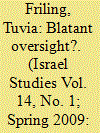

|
|
|
|
|
| Publication |
2009.
|
| Summary/Abstract |
Those acquainted with the history of the Yishuv know that a deep gap can be found in both the quality and the quantity of research on the role of labor and left wing circles in Israel's nation building process and the part attributed to the right wing. This gap extends to the representation of Revisionist activity in the areas of pre-WW II illegal immigration, wartime aid, and rescue of Europe's Jews, participation in the fighting and in resistance in Europe, clandestine cooperation with the Allies, as well as in Bricha, illegal immigration, arms procurement, and the building of the Yishuv's armed forces in the wake of the World War until the establishment of the State. Can this gap be readily dismissed by the cliché that history is written by the victors, and that the movement that led the nation-building process in those decades also perpetuated its role and uncompromisingly and systematically excluded others from the story? Or was there a "history" of revisionist activity that hasn't so far given rise to a historiography representing its role in fitting scope and quality? Or perhaps there was indeed such a "history", but the movement's leaders chose not to explore it for their own reasons, and it was they who directly or indirectly, openly or covertly, ousted themselves from the story or consciously and intentionally contributed to their own exclusion? This article provides several observations on the makeup of this gap, its boundaries, and possible roots.
|
|
|
|
|
|
|
|
|
|
|
|
|
|
|
|
| 2 |
ID:
084922


|
|
|
| 3 |
ID:
086177
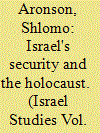

|
|
|
|
|
| Publication |
2009.
|
| Summary/Abstract |
The article analyzes David Ben-Gurion's lessons from the Holocaust and from Israel's War of Independence and deviations from his strategy. The lessons of the Holocaust were three-fold: First, that Israel, Zionism and Jews as well were a unique historical phenomenon, and therefore could expect to be alone and remain alone for decades to come. That Zionism, having lost its European backbone in the Holocaust, would have problems of legitimacy unless the Jewish state would accept the partition of Western Palestine and avoid ruling over a large number of Arabs, especially in the politically sensitive West Bank. Second, that every Israeli-initiated war will not be accepted by the Arabs as final, since they would recover and get ready for a new round, whereas Israel could not sustain one crucial defeat. Third, that the longer range solution to the total imbalance between Arabs and Jews in conventional terms, such as numbers, political and strategic clout, oil and vast territories, must be counterbalanced by invoking unconventional deterrence. The ensuing, even if limited to the elite, discussion of alternatives to this strategy was coined in terms of conventional preemption and acquisition of more territory, especially in the West Bank. The demise of Ben-Gurion's leadership in the early 1960s, and the emergence of security alternatives to his, in addition to role of the US in making the unconventional option illegitimate, would explain the road to the Six-Day War of 1967 and its ramifications until today.
|
|
|
|
|
|
|
|
|
|
|
|
|
|
|
|
| 4 |
ID:
086178
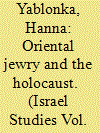

|
|
|
|
|
| Publication |
2009.
|
| Summary/Abstract |
This article deals with one of the most dominant elements in Israeli national identity-the Shoah. The paper asks how the Mizrahim in Israel related to it, since for most of them it was a remote historical chapter. The answer is given through an analysis of three generations of Mizrahim-those who lived during the Second World War and immigrated to Israel during its formative years; their children, most of whom were born in the Jewish State and educated in the Israeli educational system; and their grand children. The first generation viewed the destruction of the European Jews with profound compassion, but felt that the Shoah was a chapter in the history of the European Jews. Their children attempted to connect, facing, to a large extent, resentment and alienation. Their grand-children already have the Shoah burnt in their souls-being an integral part of their self-definition as Israelis.
|
|
|
|
|
|
|
|
|
|
|
|
|
|
|
|
| 5 |
ID:
086175
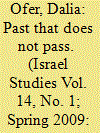

|
|
|
|
|
| Publication |
2009.
|
| Summary/Abstract |
The article raises issues that relate to the centrality of the Holocaust in the lives and imagination of many Israelis, and as a pivotal event that shapes their Jewish-Israeli identity. It examines the positions held by Israelis on the meaning of the Holocaust and the shaping of its memory, and asks whether the presence of the Holocaust in our lives represents an honest, unwavering effort to understand the Holocaust and its place in our world as human beings, Jews, and Israelis, or is a result of manipulating forces that use and abuse the memory of the Holocaust to advance unrelated political or social causes. The article presents a profusion of voices in Holocaust discourse and asks whether these are complementary or conflicting messages. It discusses the groups for whom the Holocaust was a personal experience, their offspring, who experienced the Holocaust as a family memory, and others whose memory of the Holocaust was shaped by survivors' testimonies, social processes, and the internalization of cultural messages. It focuses on the contribution of these groups in Holocaust research and artistic representation centering on literature, film, and music.
|
|
|
|
|
|
|
|
|
|
|
|
|
|
|
|
| 6 |
ID:
086176
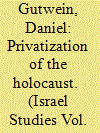

|
|
|
|
|
| Publication |
2009.
|
| Summary/Abstract |
Politically and culturally the collective memory of the Holocaust plays a key role in constructing Israeli identity. Three main periods can be discerned in Holocaust memory in Israel: divided memory, nationalized memory, and privatized memory. This article discusses the privatization of the Zionist-nationalized memory of the Holocaust in Israel during the 1980s and 1990s as an ideological product of the privatization revolution through which Israel has gone. The article focuses on the role played by Post-Zionism in privatizing Holocaust memory by depicting Zionist ideology and Israeli politics that portrayed the nationalized memory as oppressive. In privatizing Holocaust memory, Post-Zionism reaffirmed its nature as the meta-ideology of the Israeli privatization revolution and dismantling of the welfare state.
|
|
|
|
|
|
|
|
|
|
|
|
|
|
|
|
|
|
|
|
|